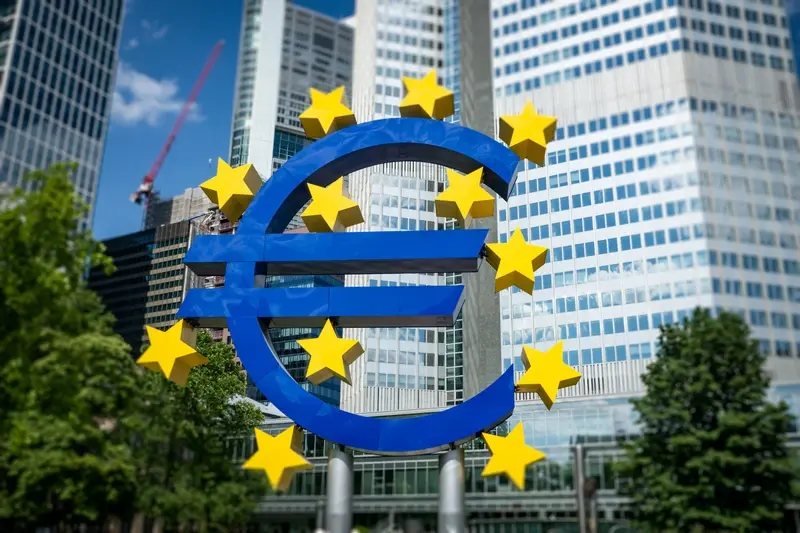
European shares fell on Thursday, with markets grappling with US inflation, Federal Reserve interest rate and geopolitical worries, with the latter hitting travel stocks.
Elsewhere among central banks, the European Central Bank left rates unmoved as expected, but the odds of a June cut have risen. The Bank of England is ‘way off’ cutting, however, a monetary policy committee member said.
The FTSE 100 index ended down 37.41 points, 0.5%, at 7,923.80. The FTSE 250 lost 14.88 points, 0.1%, at 19,786.87, though the AIM All-Share added 3.64 points, 0.5%, at 758.83.
The Cboe UK 100 ended down 0.5% at 791.95, the Cboe UK 250 rose 0.1% to 17,220.35, and the Cboe Small Companies added 0.2% to 14,770.34.
In European equities on Thursday, the CAC 40 in Paris ended down 0.3%, while the DAX 40 in Frankfurt fell 0.8%.
The pound was quoted at $1.2513 late Thursday afternoon in London, down compared to $1.2546 at the equities close on Wednesday. The euro stood at $1.0705, lower against $1.0743. It had traded just below $1.07 at one point, a year-to-date low.
Against the yen, the dollar was trading at JP¥153.30, up compared to JP¥152.88.
The European Central Bank remains on course to lower interest rates at its June meeting. The ECB left its key interest rates unchanged, as widely expected, but policymakers said they will cut rates should they gain confidence that inflation is falling to the bank’s 2% target.
European Central Bank President Christine Lagarde again affirmed a ‘data dependent’ approach to interest rate decisions, but did add that some in the Governing Council already have the confidence to cut.
Lagarde said in a post-decision press conference: ‘A few members felt sufficiently confident [to cut interest rates], on the basis of the limited data that we received in April.’
However, they then ‘rallied to the consensus’ of the large majority of euro area monetary policymakers.
ING analysts commented: ‘During the press conference, ECB President Christine Lagarde repeatedly stressed the hint at upcoming rate cuts mentioned above – but she also added that the ECB was not pre-committing to any path for policy rates. At the same time, Lagarde also mentioned that few ECB members had already been in favour of a rate cut today. Today’s meeting marked another step in the very gradual transition of the ECB’s communication since December from hawkish to dovish, even if it was probably the mildest shift.
‘The ECB clearly opted against giving more explicit guidance for a June cut. This reluctance to be more outspoken – combined with the fact that some ECB members were already in favour of a rate cut today – implies a higher degree of disagreement within the central bank. It seems as if at least some ECB members fear that still high services inflation and the recent surge in oil prices, as well as wage developments in Germany, suggest that there still is a considerable risk of inflation re-accelerating.’
The aftermath of Wednesday’s robust US consumer price inflation was still reverberating in European equities, though US tech shares were higher in mixed trade on Wall Street.
The Dow Jones Industrial Average was down 0.6% at the time of the London equities close, the S&P 500 fell 0.1%, though the Nasdaq Composite added 0.3%.
On Wednesday, the Bureau of Labor Statistics reported that the year-on-year rate of consumer price inflation picked up to 3.5% last month, from 3.2% in February, taking it further above the Fed’s 2% inflation target.
The rate of consumer price inflation had been expected to pick up to just 3.4%, according to FXStreet cited consensus. The rate of inflation is now at its most lofty since September.
Thursday’s US producer price data was less robust, but did pick up. US producer price growth accelerated to 2.1% year-on-year in March, from 1.6% in February.
Berenberg analyst Holger Schmieding noted a ‘growing gap’ between the ECB and Fed.
‘The eurozone needs rate cuts, the US economy does not as long as the pre-election fiscal expansion neutralises the impact of high Fed rates,’ Schmieding added.
Elsewhere, Bank of England rate setter Megan Greene said interest rate cuts ‘should still be a way off’ in the UK, predicting that the ‘last mile’ in getting inflation down ‘may prove the hardest’.
Greene, one of the more hawkish members of the BoE’s monetary policy committee, argued in the Financial Times that investors had underestimated the risk that inflation would remain high for longer in the UK than in other advanced economies.
In London, shares in airlines slumped amid rising global tensions. British Airways parent International Consolidated Airlines Group gave back 3.7%, budget carrier easyJet fell 3.6%.
Israel was on alert Thursday after its arch foe Iran threatened reprisals over a strike in Syria this month that killed two Iranian generals, and as the war against Hamas ground on in Gaza.
Days after Israel strengthened its air defences and paused leave for combat units, the US also warned of the risk of an attack by Iran or its allied groups at a time Middle East tensions have soared.
Iran is ‘threatening to launch a significant attack on Israel,’ US President Joe Biden said Wednesday, pledging ‘ironclad’ support for its top regional ally despite diplomatic tensions over Israel’s military conduct in Gaza.
Crude prices were higher than they were this time on Wednesday, though Brent remained a touch below $90 a barrel. Brent oil was quoted at $89.94 a barrel late in London on Thursday, up from $89.31 late Wednesday.
Gold was quoted at $2,338.05 an ounce, up against $2,334.91.
Back in London, consumer goods firm Reckitt, lender Lloyds Banking Group and insurer Aviva fell 2.3%, 4.6% and 6.4%. The trio went ex-dividend, meaning new share buyers do not qualify for the latest payout.
At the other end of the large cap index, AstraZeneca, once of its largest constituents, added 2.1%. It said it plans to increase its dividend by 7% in 2024, having left the payout flat last year.
The Cambridge, England-based pharmaceutical company said the increase will be by 20 US cents to $3.10 per share.
For 2023, AstraZeneca had paid a total dividend of $2.90, which was unchanged from 2022, despite skyrocketing profit on the back of lower sales costs.
DIY retailer Kingfisher and engineering company Smiths rose 2.4% and 2.7%. Both were raised to ’buy’ from ’hold’ by HSBC.
Elsewhere in London, Lok’n Store Group jumped 17% to 1,120.56 pence, after it accepted a takeover approach from Shurgard Self Storage that values the business at £378 million.
The cash bid is worth 1,110 pence per Lok’n Store share, a 16% premium to the self-storage provider’s closing price of 958p on Wednesday, and 2.3% above its all-time closing high of 1,085p in January 2022.
Brussels-based Shurgard, the largest developer, owner and operator of self-storage facilities in Europe, said the deal represented an ‘attractive opportunity’ to accelerate its growth strategy and create value for shareholders.
Lok’n Store said it considered the terms of the offer ‘fair and reasonable’, and recommended shareholders accept the bid. Shurgard said that, as of Wednesday, it has received irrevocable undertakings to vote in favour of the deal for about 19% of Lok’nStore’s shares.
Friday’s economic calendar has a UK gross domestic product reading and German inflation data at 0700 BST.
In the local corporate diary, building materials company SigmaRoc reports a trading statement.
Over in New York, the banking earnings season kicks off. Citigroup, JPMorgan Chase and Wells Fargo release first-quarter numbers. Asset manager BlackRock also reports.
Copyright 2024 Alliance News Ltd. All Rights Reserved.




